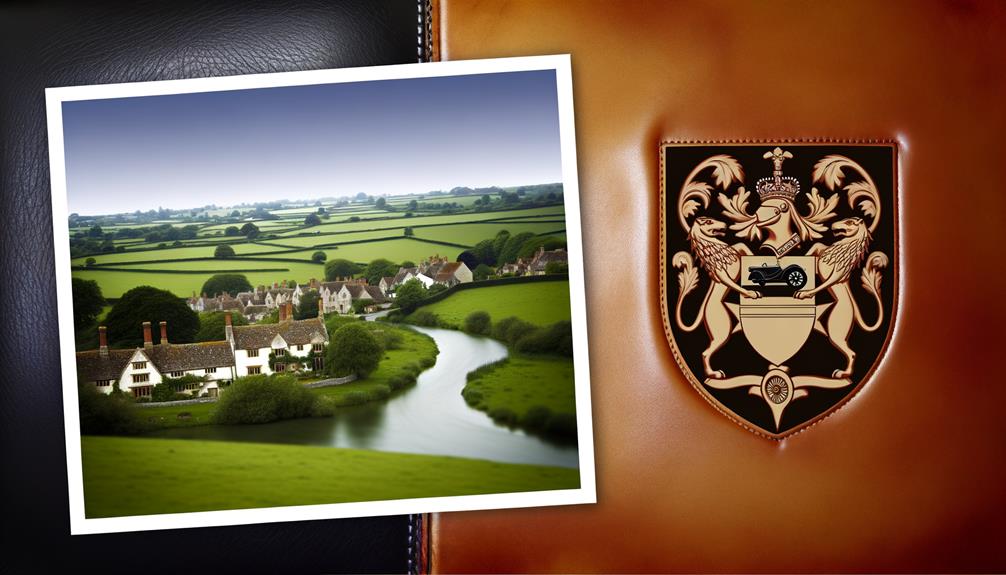Meaning of the Name Bentley
Bentley is derived from the Old English terms 'beonet' meaning bent grass, and 'leah,' which means woodland or clearing. Historically, the name relates to settlements where bent grass grew abundantly, reflecting early rural settings and agricultural practices of Anglo-Saxon communities.
Bentley has long symbolized affluence and prestige, often associated with nobility and modern luxury. Its popularity surged in the late 19th century and has seen peaks, especially around 2012.
Attributes linked to Bentley include elegance, strength, and a blend of tradition with modernity. Learn more about the rich history and cultural significance of this distinguished name.

Key Takeaways
- Bentley originates from Old English, combining 'beonet' (bent grass) and 'leah' (woodland or clearing).
- Historically linked to settlements with specific topographical features crucial for agriculture.
- Symbolizes affluence and prestige, often associated with nobility and luxury.
- Popularity peaked in the U.S. around 2012, reflecting cultural trends toward sophistication.
- Conveys qualities of elegance, strength, leadership, and resilience, blending tradition with modernity.
Origins of Bentley
The name Bentley originates from Old English, specifically deriving from the elements 'beonet' meaning 'bent grass' and 'leah' meaning 'woodland' or 'clearing.'
This etymological composition suggests a geographical connection, typically denoting a location where bent grass thrived within a wooded or cleared area.
The term 'bent grass' refers to a type of grass commonly found in meadows or pastures, implying that the original bearers of the name likely resided in or near such landscapes.
The dual components of the name highlight the environmental features prevalent in early English rural settings.
This linguistic heritage underscores Bentley's roots in the natural world, reflecting a historical dependency on and interaction with the surrounding landscape in naming conventions.
Historical Context
Understanding the historical context of the name Bentley necessitates an examination of Anglo-Saxon settlement patterns and land usage during the early medieval period.
The term 'Bentley' derives from Old English elements 'beonet' (meaning bent grass) and 'leah' (meaning clearing or meadow).
During the early medieval period, settlements were often established in areas characterized by specific topographical features, such as meadows or clearings surrounded by bent grass. These locales were essential for agricultural activities and community sustenance.
The strategic selection of such sites underscores the pragmatic considerations of Anglo-Saxon settlers, who named places based on their environmental attributes.
The name Bentley thus reflects a historical interaction between human settlement practices and the natural landscape during this formative period.
Cultural Significance
Having established its historical roots, the name Bentley also bears considerable cultural significance, reflecting its enduring presence in literature, nobility, and contemporary society. In literature, Bentley often symbolizes affluence and refinement, aligning with its aristocratic connotations. Its use among British nobility further enhances this image, associating the name with heritage and prestige. Additionally, in modern contexts, Bentley is frequently synonymous with luxury, largely due to the renowned automobile brand.
| Cultural Aspect | Significance |
|---|---|
| Literature | Symbolizes affluence |
| Nobility | Heritage and prestige |
| Contemporary Usage | Synonymous with luxury |
| Automobile Brand | Reinforces modern luxury |
Such multifaceted cultural influences underscore Bentley's broad resonance across various societal strata, highlighting its lasting appeal.
Popularity Over Time
Tracing the popularity of the name Bentley over time reveals a dynamic trajectory shaped by historical events, cultural shifts, and evolving societal values. Initially emerging as a surname with Anglo-Saxon roots, Bentley gained traction in the United States in the late 19th century.
Its ascent was particularly notable in the early 21st century, coinciding with a broader trend of adopting surnames as first names. The name's appeal was further bolstered by its association with luxury and sophistication, thanks to the renowned British car manufacturer Bentley Motors.
Statistical data from the Social Security Administration indicate a significant rise in popularity, peaking around 2012. This evolution underscores the interplay between cultural influences and naming conventions in shaping public preferences.
Characteristics and Traits
Often associated with qualities of elegance, strength, and reliability, the name Bentley conveys a sense of refined sophistication and enduring appeal. Individuals bearing this name often exhibit traits synonymous with leadership, resilience, and a steadfast nature. The name itself evokes an image of someone who is both poised and determined, capable of maneuvering complex situations with grace.
Additionally, Bentley is frequently linked to a keen intellect and an inherent sense of responsibility, making it a popular choice among those who value tradition and excellence. The name also suggests a certain level of ambition and drive, qualities that are often reflected in the personal and professional lives of those who carry it. As a result, Bentley embodies a blend of tradition and modernity.
Conclusion
The name Bentley, originating from Old English roots, juxtaposes the pastoral simplicity of "bent grass" with the sophisticated grandeur of luxury automobiles bearing the same name. Historically rich, it evokes images of both ancient English villages and modern high-end vehicles.
Culturally, Bentley resonates with notions of elegance and tradition. Over time, its popularity has waxed and waned, reflecting societal shifts. The name Bentley embodies a blend of rustic charm and refined prestige, making it a timeless choice.






